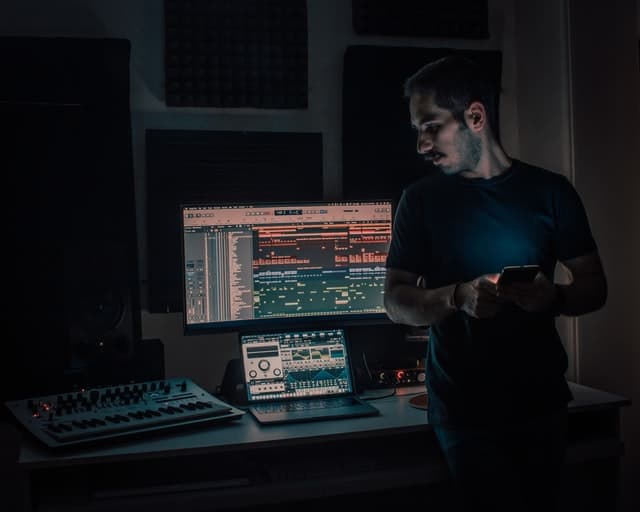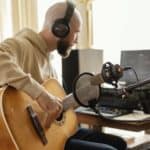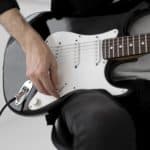For a long time, musicians have looked down on the Ipad as a tool for music, but it’s worth keeping an open mind if you’re new to music and are wondering what sort of tools you’ll need to accompany you and your guitar.
It largely depends on your goals as a musician and what your workspace looks like.
So which one should you get?
If you want portability and convenient size, an Ipad will probably suit you, if you want maximum functionality, you should go with a Laptop.
Technology is making everything so much easier. It’s a great tool, and especially great for musicians.
Whether you’re learning or recording, having a good setup is instrumental (pun intended) in making being the best musician you can be as easy as possible.
The question we want to ask today, is which is better for a musician, a laptop or an Ipad?
But let’s start with why you even need tech in the first place.
Why do musicians nowadays need digital interfaces?
Digital interfaces to create ideas
Music software is quite convenient, thanks to its visual interfaces, but the backbone of music production, recording, and learning on most music software comes down to their digital audio workstations (DAWs).
This is music production software that allows users to record audio conveniently. DAWs work on both laptops and Ipads.
VSTs
A Virtual Studio Technology (VST) is an audio plug-in software interface that integrates software synthesizers and effects units into digital audio workstations.
VST and similar technologies use digital interfaces to serve the same purpose that effects units do in physical studios (EQ, reverb, etc.) Some VSTs are designed to let you monitor visual feedback (such as input signal), in which case they do not process the audio.
VSTs are great because they allow a lot of the functionality of a real studio without the need for all the expensive equipment.
Programs for song composition
There are myriad songwriting and audio production software out there.
Thanks to all the available songwriting tools we have at our fingertips today, songwriting and composition have never been easier. While our instruments remain physical, everything we use to work with them has become digitized.
You can write music and play it back in real-time, layering melodies as you go and making changes on the fly.
Learning tools for musicians
Almost every DAW these days comes with a library of tools to help you learn and if you can’t find built-in learning, there’s often a community or forum with many of the answers you need.
Below are some great learning programs for musicians:
- Yousician
- Songster
- Bandlab
- Ultimate Guitar
If you’re interested in learning to compose music or create your own songs, you can also check out:
- FL Studio (good for recording and mixing).
- MuseScore (a handy tool for composers and music students, plus it’s free).
- Guitar Pro (Great for playing along with tabs and exercises).
- Tuxguitar (free Guitar Pro alternative)
Ipad for musicians, is it a good choice?
A lot of musicians used to look down on the Ipad as a device for music production, but it’s steadily been growing into a viable tool for industry-standard music production. Ipads come with their setbacks when compared to a laptop, but they also have advantages.
Pros
- Portability: it’s less clunky to cart around than a laptop and if you’re looking to make quick recordings, it doesn’t require you to set up mics and inputs.
- Logic Pro and Garage Band: Two great music production apps that have improved tremendously over the last few years and can compete with other industry-level programs used on laptops.
- App Selection: Ipads have an enormous selection of apps for music production, this can be great for inspiration.
- Modularity and accessories: there is an app for almost anything.
- Great workflow when being used for sketching out song ideas: the touch screen interface that you have on an Ipad allows for some features that you won’t find on your laptop when it comes to making music.
Cons
- File Management: Ipads have been known for their troubles with
- Memory Limitations: Unless you’re willing to pay top dollar, most Ipads don’t come with a whole lot of memory when compared to laptops.
- Some professional music production software such as Logic Pro and Adobe Audition is not supported on Ipad.
- Processing power is less than most laptops.
The main thing to remember is that an Ipad is not a laptop and you can’t use them in the same way. They’re both completely different workflows.
Here’s a nice take on whether a budget Ipad would work for music production
Laptop for musicians, is it worth it?
Laptops or desktops are usually the go-to when it comes to home studio software and recording.
Pros
- Convenience: Laptops come as finished products with everything you need for the most part. Laptops can support most music production software without much need for added devices.
- Has more ports allowing for different kinds of device add-ons.
- Greater storage space: Nowadays, your average laptop comes with between 500 GBs and 1 TB of storage space, which comes in handy when you’re creating music and have tons of unfinished things lying around in folders.
- Storage management: Laptops allow for greater control over your storage space and file management.
- Screen and Monitors: being that music production is a very visual craft, having a bigger screen helps tremendously. Having more than one screen allows you to split up your workspace which can make music production even more efficient.
Cons
- Pricy: Laptops can be more expensive than an Ipad, but they also come with more functionality.
- Durability: Laptops have a higher rate of wear and tear and you might spend a lot on repairs and replacements.
- Are less useful in live setups: Compared to Ipads, your laptop will tend to need the songs you want to play live already recorded and set up. There are musicians that get by using a laptop (South African musician Matthew Mole is a good example), but Ipads are simply better when it comes to live interface functionality.
A more in-depth look at the differences between an iPad and a Laptop
What to consider when getting a laptop
If you’re going to get a laptop for music production, there are some specs you’ll need to take into consideration (you don’t want to fork out for a laptop and find that it’s crippled by bad hardware choices).
You should consider your desired level and frequency of use for a laptop. Are you going to play around with sketching tunes for fun once in a while or do you plan on putting in some serious work to create industry-level music?
There’s a good chance you end up going deeper than you intended to so it’s not a bad idea to think about buying a laptop that you can grow into. That means maxing out the specs if possible.
Things to look at:
The CPU: You want to make sure your laptop has a powerful enough CPU to handle the heavy work of music production.
RAM: Random Access Memory (that’s what it stands for…) holds the information a computer needs, like the data in an application, in a short-term space so it can be quickly accessed. RAM is especially important for music production if you plan on having multi-track recordings.
Storage: When it comes to storage, we are referring to your computer’s hard drive. You get two kinds of drives, the older kind which is a moving parts drive called HDD, and the newer kind called SSD. I recommend making sure you get a laptop with an SSD for a few reasons.
For one, SSDs are more durable and less energy-intensive on your laptop, and for two, they are faster. Your Laptop’s RAM and Hardrive work in tandem, and having a faster drive means your ram won’t be held back.
Other alternatives
Desktops are an obvious alternative. They’re less pricy than a laptop with the same specs and are more modular, meaning it’s easier to upgrade and maintain them. They do have the drawback of not being portable though.
However, the greater storage and processor strength more than compensates for any drawbacks.
Phones: Lately, the phone trend is huge storage space and now the average mid to high-end phone comes with around 60-100GBs of built-in memory.
Phones are also constantly being developed with more and more powerful processors, to the point where you can even play graphically demanding video games on them these days. Phones also come with microphones built-in and some are quite high quality.
I used to use my phone to record acoustic songs in the past and I still do now when I don’t feel like setting up my laptop and recording equipment.
Which one should you get?
It depends on your goals:
| iPad | Laptop |
| If you want to trigger samples live, the touch screen of an iPad will be useful. If you want portability and the ability to write music anywhere, an iPad will be better. If you want something that allows you to create a lot of rough ideas at a moment’s notice, your better bet is the iPad. | If you want a setup that allows you to add mics and soundcards, a laptop is better. If you want the best performance per dollar, a laptop is for you. If you plan on spending hours creating songs and you’re interested in creating complex multi-track recordings, you should try a laptop. |
Here’s a more in-depth comparison
Conclusion
In the end, it comes down to preference and while I might like to use a laptop for music creation, that may simply be because I haven’t spent a lot of time trying it out on an iPad/tablet.
It might be a completely opposite experience for you.
One important thing to note is that regardless of the device you choose, all music software comes with a learning curve and you’ll mainly be limited by your own skill and knowledge or lack thereof.
No matter which you choose, choose to learn it well.
If you want to make a home studio, here’s a great video on the gear you’ll need:

Hello there, my name is Ramiro and I’ve been playing guitar for almost 20 years. I’m obsessed with everything gear-related and I thought it might be worth sharing it. From guitars, pedals, amps, and synths to studio gear and production tips, I hope you find what I post here useful, and I’ll try my best to keep it entertaining also.





